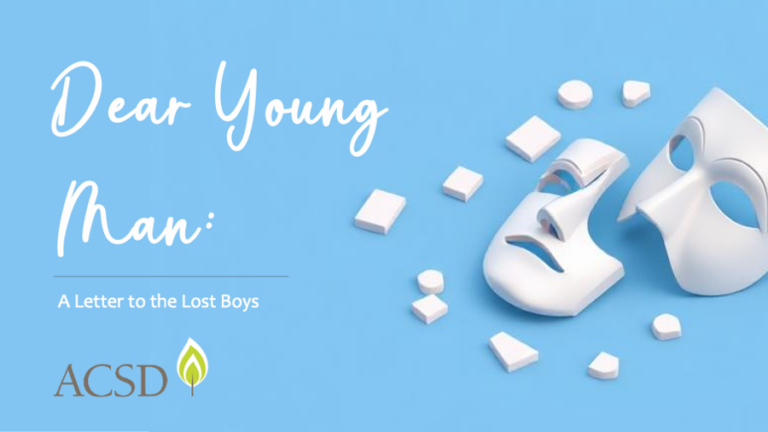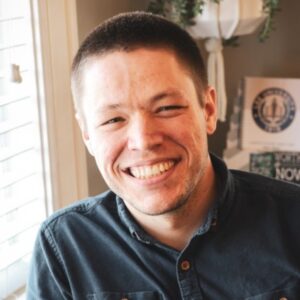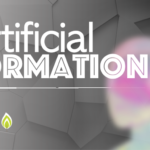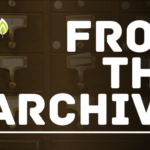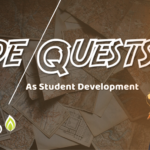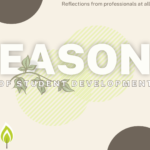![]() This content is brought to you by the Association for Christians in Student Development (ACSD), a volunteer membership organization committed to equipping and challenging faithful professionals to infuse their Christian faith into student development practice and scholarship. Thoughtful content such as this is made possible by volunteer contributions and the financial support of membership dues. Interested in becoming a member for more awesome content just like this? Join today by clicking here!
This content is brought to you by the Association for Christians in Student Development (ACSD), a volunteer membership organization committed to equipping and challenging faithful professionals to infuse their Christian faith into student development practice and scholarship. Thoughtful content such as this is made possible by volunteer contributions and the financial support of membership dues. Interested in becoming a member for more awesome content just like this? Join today by clicking here!
“I could picture hundreds and hundreds of boys living on the wrong sides of cities, boys with black eyes who jumped at their own shadows. Hundreds of boys who maybe watched sunsets and looked at stars and ached for something better. I could see boys going under street lights because they were mean and tough and hated the world, and it was too late to tell them that there was still good in it, and they wouldn’t believe you if you did. It was too much of a problem to be just a personal thing. There should be some help, someone should tell them before it was too late.“
– S.E. Hinton, The Outsiders
Dear Young Man,
They say that you’re falling behind. Over the past 30 years, there has been a distinct shift in the demographics of college enrollment, and you’ve become a rarity on campuses across the country. In spring 2021, you represented only 40.5% of undergraduate students (Mangan, 2022), down significantly from 1970 when men made up 58% of total college enrollment (National Center for Education Statistics, 2021). Those of you who are Black and Hispanic are even less likely to attend college. The American Institute for Boys and Men suggests that you are not only less likely to attend college, but you’re also less likely to complete a college degree as the four-year graduation rate for men is 43% compared to 54% for women (Reeves, 2024). The emerging reality is that you are less likely to attend, you are less likely to stay, and you are less likely to engage in the college experience. And it’s not just college – men are facing more challenges than ever in the labor market, addiction rates, mental health, suicidality, and more (American Institute for Boys and Men, 2024).
In short, everyone is saying you’re lost.
In JM Barrie’s Peter Pan, the Lost Boys were a motley crew. They had never been tucked in and never had their clothes darned with pockets (Barrie, 1911). They found themselves without purpose, muddling from quarrel to quarrel, unsure of their identities and left with want. And yet, they performed their part as Lost Boys – rambunctious rapscallions who never grow up, yearning for a fight. They derived life and energy from the legends and stories of their escapades from Mermaid Lagoon to Cannibal Cove.
And such is your experience of performing masculinities described today – untucked and unpocketed – attempting to measure up to the expectations of a society that is fiercely divided on the features that define you. Keith Edwards (2009) describes this experience as a constant struggle of masking and unmasking to meet these definitions and expectations; wherein ultimately you become disconnected from your values and stories that shape you. And, much in the same way Peter Pan’s Lost Boys were enamored by stories, we must become better at calling each other towards a higher calling with our stories. We need better stories of men and masculinities.
Deep Spirited Friendship
I have long been intrigued by the deep spirited friendship exhibited by David and Jonathan. Jonathan had every reason to detest David. After all, David had been anointed by Samuel for the very throne that was Jonathan’s birthright. And yet, Jonathan and David knit their souls together, with Jonathan sacrificing that birthright, his weapons, and his very robe to help David escape from King Saul (1 Samuel 18:1-4). Jonathan embraced a friend with sacrifice, humility, vulnerability, and noble risk.
Christine Emba (2023a) suggests that some of these stories of humility can come from stories and songs, much like in the examples of David and Jonathan. They are also found in other figures – fathers and teachers, namely. But the truth is, young man, we are struggling. As Emba (2023b) describes, “While the past 50 years have been revolutionary for women… there hasn’t been a corresponding conversation about the role men should play in a changing world.” And we are not finding solace in our fathers and teachers – perhaps some of those stories are broken, marred, or nonexistent. We are unable to grapple with their imperfections or vulnerabilities. Instead, we have settled for narratives of masculinity from the corners of the internet known as the manosphere, or in some more palatable cases, the manosphere-lite. Men who beckon and call towards power-over, pride, violence, and selfish gain.
And thus in our hunger for stories of comfort, adventure, and prowess like the Lost Boys, we have traded one script for another. Still untucked. Still with our empty pockets.
A New Script
But there are narratives of masculinity that stand the test of time, and a means by which we can pursue those stories of sacrifice, humility, vulnerability, and noble risk. We must foster character. But how?
Relationships & Community
In our hyper-individualized culture, men are supposed to maintain independence as a signal of their masculinity. But this independence has led to a pandemic of loneliness (American Institute for Boys and Men, n.d.).
We find David and Jonathan embracing relationship and interdependency on one another – mutual submission – for each other’s betterment. We must shift from an individualized narrative to a communal one. A community that celebrates and champions both the betterment of men and women.
Suffering & Compassion
Henri Nouwen (2010) offers a simultaneously encouraging and challenging perspective: “Suffering invites us to place our hurts in larger hands. In Christ we see God suffering – for us. And calling us to share in God’s suffering love for a hurting world. The small and even overpowering pains of our lives are intimately connected with the greater pains of Christ. Our daily sorrows are anchored in a greater sorrow and therefore a larger hope.”
A deeper, more intimate connection with the pains of Christ help cultivate hopeful compassion. Compassion invokes us to “suffer with” one another as we express challenges, face barriers, and wrestle with our masks of masculinity. “We know that suffering produces perseverance; perseverance, character; and character, hope” (Romans 5:3b-4).
Humility & Presence
We are trapped in a conundrum between the tension of the desire to be truly known and the persistent, niggling fear that someone might somehow truly know us. This has led us to be anguished over the appearance of our masks of masculinity and the performance for which we wear them. The obsession quickly becomes focused on ourselves.
Tim Keller (2012) explains that whether this obsession manifests itself in a veneer of self-confidence or a stench of self-degradation, the common thread is clear: pride. He suggests, “True gospel-humility means I stop connecting every experience, every conversation, with myself. In fact, I stop thinking about myself. The freedom of self-forgetfulness. The blessed rest that only self-forgetfulness brings.” Such self-forgetfulness comes in the grace of the presence of God. In small, faithful moments when we acknowledge that God is over, in, and with us.
Young man, may we embrace better stories and forge character with these new scripts. May we shed the masks and scripts we feel obliged to wear and perform by embracing suffering and cultivating hopeful compassion. May we embrace relationships and community to build each other up and tuck each other in. And may we sew on new pockets to our garments, rich with the confidence not of our own might, but wealthy with the humility and grace found in the presence of God.
Love,
A Fellow Lost Boy
References
- American Institute for Boys and Men. (2024). The state of working class men. https://aibm.org/wp-content/uploads/2024/08/WORKINGCLASS_FORPUB.pdf.
- American Institute for Boys and Men. (n.d.). Mental health: Boys and men are increasingly lonely, and at higher risk of suicide and “deaths of despair. https://aibm.org/why-we-exist/focus-areas/mental-health/.
- Barrie, JM. (1911). Peter Pan.
- Edwards, K. & Jones, R. (2009). “Putting my man face on”: A grounded theory of college men’s gender identity development. Journal of College Student Development, 50(2), 211-228.
- Emba, C. (2023a). “How should men be? Who’s an ideal man? Our male readers have thoughts.” The Washington Post.
- Emba, C. (2023b). “Men are lost: Here’s a map out of the wilderness.” The Washington Post.
- Keller, T. (2012). The freedom of self-forgetfulness. 10Publishing.
- Mangan, K. (2022). “The Male Engagement Crisis.” The Chronicle of Higher Education.
- National Center for Education Statistics. (2021). Total undergraduate fall enrollment in degree-granting postsecondary institutions by attendance and control and level of institution: Selected years, 1970 through 2030. Digest of Education Statistics. Last accessed 19 March 2023 at https://nces.ed.gov/programs/digest/d21/tables/dt21_303.70.asp.
- Nouwen, H.J. (2010). Turn my mourning into dancing: Finding hope in the hard times. Thomas Nelson.
- Reeves, R. & Slecker, W. (2024). “Degrees of difference: Male college enrollment and completion.” American Institute for Boys and Men. https://aibm.org/research/male-college-enrollment-and-completion/.

